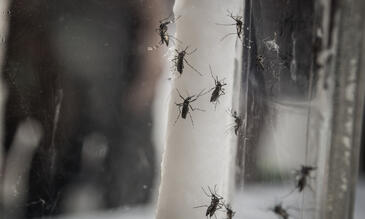
The LITE facility is housed within purpose built, state-of-the-art facilities in the Liverpool Accelerator building in which we undertake studies to assess insecticide efficacy.
LITE can conduct a range of standard insecticide bioassays, including many of those recommended by WHO. We also have a wide range of equipment which allows us to offer specialised testing services including:
- Potter tower; used for coating surfaces (e.g. mud plates, tiles (ceramic, wood)) with insecticide. This is the WHO standard equipment for spraying of surfaces used for IRS.
- Track Sprayer; used to treat surfaces (tiles, filter paper, mud plates and larger panels) with accurate concentrations of insecticide and even surface coverage. The track sprayer is currently in the process of in-house validation for accuracy, efficiency and cleaning.
- Temperature and Humidity cabinets; for storage of samples and surfaces. Stability cabinets are used to replicate specific environmental conditions and for the storage of treated surfaces at accelerated environmental conditions.
- Wind tunnel; used in laboratory studies to evaluate insecticides for indoor and outdoor space spray applications. The wind tunnel is used to test the insecticidal activity of active ingredients for use in aerosols.
- Insecticide chambers/Peet Grady Chamber; allows for aerosol testing of insecticidal products. The chamber is used to assess volatile compounds from products commonly used for vector control for indoor housing including coils, vaporizers, ambient emanators and aerosols. The vapour activity of technical grade insecticides can also be assessed.
- Net washing equipment; allows for net washing using both the WHO and CIPAC methods, nets can then be tested for wash resistance, chemical analysis, bioefficacy.
- HPLC; High Performance Liquid Chromatography equipment is used for analytical chemical quantification of the insecticide content in vector control products.
- Standard and fluorescent microscopes; used for imaging and viewing of insects, imaging of fluorescent dyes and studies on transgenic mosquito strains.
- Real-time quantitative PCR systems; qPCR is routinely used for profiling of mosquito strains for resistance markers and can be used for bespoke assays as required.
